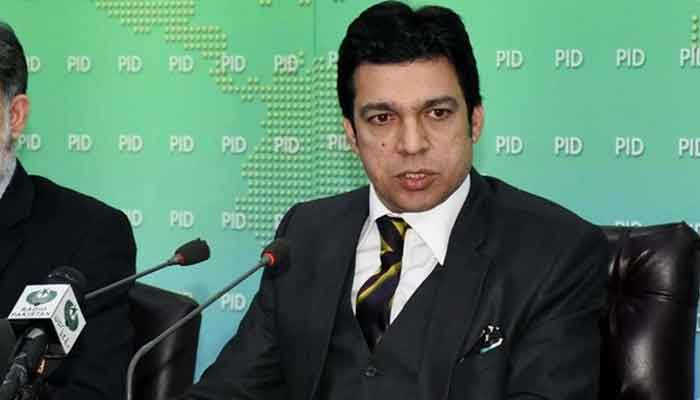India allows Pakistan to visit controversial water projects
Faisal Vawda last month, while talking to media persons, had said, “We have a very major issue of the Indus Waters Treaty with India. We are making a programme for addressing this issue in a very aggressive way and are going forward. And we hope to resolve the issues soon.”
ISLAMABAD: The government has announced that a breakthrough has been achieved in allowing a Pakistani team to inspect controversial Indian water projects on the Chenab River.
Islamabad blames New Delhi for violating the Indus Waters Treaty 1960 after building these dams, especially on their designs. Minister for Water Resources Faisal Vawda said, “Pakistan and India have been into the Indus Waters Treaty dispute for ages. Due to our continued efforts, there is a major breakthrough that India has finally agreed to our request for inspection of Indian projects on the Chenab basin.” He made this announcement through his social media page.
A three-member inspection team would go to India and carry out inspection of controversial Indian water projects from Jan 27 to Feb 1, 2019. The commissioner for Indus Waters, Syed Meher Ali Shah, who is a Joint Secretary in Water Resources Ministry, would be heading the delegation.
“We welcome this gesture from India and we expect the same spirit for resolution of other outstanding issues,” the minister said. Pakistan has been continuously calling the World Bank regarding the Indian government’s violation of the Treaty and demanding setting up a ‘court of arbitration’ to settle the water disputes between both the neighbouring countries. This treaty was brokered by the World Bank in 1960.
Pakistan and India have disputes on the construction of 330MW Kishanganga and 850MW Ratle hydropower projects being built by India on Jhelum and Chenab, respectively, on which Pakistan has unrestricted use rights under the treaty.
Pakistan has severe objections on the designs of these controversial projects and Islamabad has been requesting the Bank for the constitution of court of arbitration since long, while India is asking for appointment of a neutral expert to look into the issue.
With the changing geo-political situation of the region, while China, Russia and Turkey are acknowledging that water is the major issue of Pakistan, the World Bank had to set up the court of arbitration (for settling dispute between Pakistan and India), a senior official said. The World Bank was not responding positively as the Indian lobby was strong and its official was sitting on top posts of the Bank.
Faisal Vawda last month, while talking to media persons, had said, “We have a very major issue of the Indus Waters Treaty with India. We are making a programme for addressing this issue in a very aggressive way and are going forward. And we hope to resolve the issues soon.”
Negotiations between Pakistan and India were stuck since 2014, and a few months back these talks were restored. In December 2018, Secretary Water Resources Shamail Ahmad Khawaja had said that inspection of projects on Chenab basin was planned with the permission of the Indian government, but latter the visit was postponed as New Delhi informed Islamabad that the visit is not possible as there are elections in India, especially in Indian-Held Kashmir.
In October 2018, at a news conference, Joint Secretary Syed Meher Ali shah, who has additional charge of commissioner for waters, had said that Indian government was not allowing Pakistani delegation to visit the sites of controversial New Delhi’s Kishanganga and Ratle power projects.
“We had planned to visit from October 7 to 12, 2018, and India first agreed, but later refused. Now, again the Indian government has agreed allowing the Pakistani inspection team to visit the project sites being built on the Chenab River, which a welcome sign for improving ties."
-
 King Charles Speaks Out Over Andrew's Scandal: 'Stand Ready To Help Police'
King Charles Speaks Out Over Andrew's Scandal: 'Stand Ready To Help Police' -
 Dax Shepard Recalls Horrifying Accident That Almost Killed Him
Dax Shepard Recalls Horrifying Accident That Almost Killed Him -
 Logan Paul's Bodyguard Hits Fan On Super Bowl Day
Logan Paul's Bodyguard Hits Fan On Super Bowl Day -
 Epstein Files: Anne Hathaway Mentioned As Highly Desired Guest For Bill Gates?
Epstein Files: Anne Hathaway Mentioned As Highly Desired Guest For Bill Gates? -
 Prince Harry Under A Lot Of Stress As Meghan Markle Makes Bizarre Demands
Prince Harry Under A Lot Of Stress As Meghan Markle Makes Bizarre Demands -
 Princess Beatrice, Eugenie's Subtle Break From Disgraced Parents Exposed
Princess Beatrice, Eugenie's Subtle Break From Disgraced Parents Exposed -
 Baby Left In Running Bathtub Dies After Father ‘forgets’ Him
Baby Left In Running Bathtub Dies After Father ‘forgets’ Him -
 King Charles Takes A Major Step To Keep Horrified Prince William Out Of The Loop On Andrew: Insider
King Charles Takes A Major Step To Keep Horrified Prince William Out Of The Loop On Andrew: Insider -
 Taylor Swift Set To Make Biggest Cut From Her Wedding Guest: Blake Lively Or Ryan Reynolds
Taylor Swift Set To Make Biggest Cut From Her Wedding Guest: Blake Lively Or Ryan Reynolds -
 Prince William Meets Saudi Crown Prince Mohammed Bin Salman
Prince William Meets Saudi Crown Prince Mohammed Bin Salman -
 Brooklyn Beckham Brutally Cuts Off Inner Circle Amid Feud With David, Victoria
Brooklyn Beckham Brutally Cuts Off Inner Circle Amid Feud With David, Victoria -
 Kaley Cuoco Reveals Why Fiance Tom Pelphrey Sleeps In Seperate Room
Kaley Cuoco Reveals Why Fiance Tom Pelphrey Sleeps In Seperate Room -
 Ghislaine Maxwell Will Not Answer Congress Questions On Epstein
Ghislaine Maxwell Will Not Answer Congress Questions On Epstein -
 Kensington Palace Announces Prince William's Arrival In Saudi Arabia
Kensington Palace Announces Prince William's Arrival In Saudi Arabia -
 ‘Andrew Crisis Follows King Charles Everywhere Now’
‘Andrew Crisis Follows King Charles Everywhere Now’ -
 Jennifer Aniston Already Decided Her Wedding Dress?
Jennifer Aniston Already Decided Her Wedding Dress?




